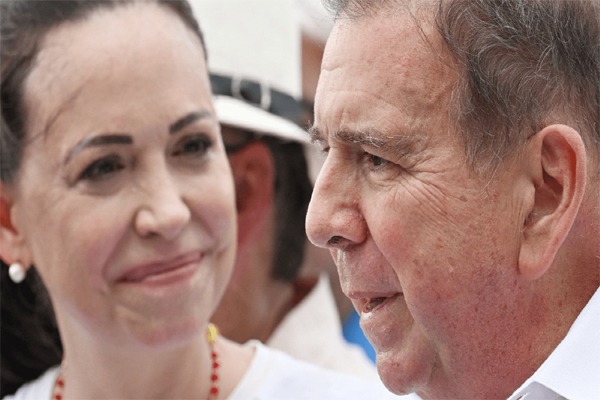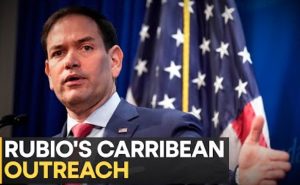
Patricia Laya and Andreina Itriago Acosta, Bloomberg News
CARACAS
EnergiesNet.com 07 15 2024
There’s little to trust about Venezuelan elections, which is why the vote on July 28 has become an interesting one. Nicolás Maduro has had a firm grip on the country’s presidency since 2013, when he succeeded his late mentor and predecessor, Hugo Chávez. Of late, Maduro has purged his inner circle, somehow managed to stabilize a shaky Venezuelan economy, and now seems willing to take his chances with an open vote.
Against all odds, a credible opposition candidate, Edmundo González Urrutia, remains in the race. So far, Maduro is letting González run, which could be his attempt to show the international community he’s taken a step toward fairer elections.
But what makes this election even more compelling is the main Venezuelan opposition figure, María Corina Machado. Despite being banned from the ballot, Machado has kept campaigning across the nation, bringing together spontaneous rallies that stretch into the night; the supporters’ mobile-phone flashlights have become a powerful symbol of the opposition. Machado’s backing could continue to help González, who currently holds a 20 percentage point lead over Maduro in polls.
How legit are Venezuela’s presidential elections, really?
Accusations of fraud and government interference have marred Venezuelan elections for years. This time, Maduro’s government has banned his biggest rival, Machado, from holding public office. In response to that and other violations of an electoral agreement, the US reinstated economic sanctions against Venezuela, maintaining that the upcoming elections were not fair and free.
Maduro’s administration rescinded an invitation for the European Union to monitor the July election, citing sanctions on some Venezuelan officials. The Carter Center and the United Nations later decided to send small groups of electoral experts to observe the vote. One May survey showed that if Maduro secures a third term in power, 41% of Venezuelans will consider leaving the country and joining an already massive diaspora of 7.7 million people. The exodus has deeply affected other countries in the region and the US, where an influx of migrants is one of the issues threatening President Joe Biden’s bid for reelection.
In the weeks ahead of the vote, Venezuela decided to resume talks with the US that had been stalled for more than two months. A virtual meeting between the parties was held July 3, with no significant progress. Maduro’s negotiator, Jorge Rodríguez, later said in a radio interview that talks will continue “after Maduro is elected on July 28.”
How have the elections played out before?
In previous races, such as the presidential elections in 2018, the opposition opted to boycott the vote. Those results were disastrous for the opposition, disenchanting voters and contributing to a low turnout; Maduro won almost 68% of the vote.
Clear tampering on behalf of Maduro ahead of the race led the international community to question the vote’s legitimacy, eventually leading dozens of countries to recognize then-opposition leader and National Assembly President Juan Guaidó as the country’s leader rather than Maduro. That strategy ultimately failed, leaving many Venezuelans residing abroad in a diplomatic gray zone that remains unresolved.
What’s different about this election, then?
Venezuela’s opposition movement has endured two decades of persecution and harassment, along with plenty of infighting, failed strategies and exiled leaders. Yet the opposition sees a unique opportunity for political change this time, with a unified opposition leadership and growing disapproval of Maduro’s management. The opposition also had a noteworthy win in 2022, when it beat Maduro’s party in a gubernatorial race in Chávez’s birthplace.
But the fear of funny business remains. While Maduro signed a deal with seven out of the nine other presidential candidates, to recognize the results of the race, sources with knowledge of the matter say his administration is considering disqualifying González or blocking the opposition’s coalition. There’s also a possibility that Maduro could suspend the election or alter the results. Venezuela’s Information Ministry said the idea that Maduro had plans to cheat were unfounded speculation.
Who is María Corina Machado?
Machado is a 56-year-old conservative firebrand and former lawmaker. She comes from a wealthy family, and her father’s steel-making company, Sivensa, was the country’s second largest when Chávez seized it in 2010. The experience helped shape her view that the state should not interfere in the economy.
“It confirmed how destructive socialism and a government that seeks total control can be,” Machado said in a 2023 interview. “I also experienced firsthand, like thousands of Venezuelans, what it’s like to be robbed and looted by this regime.”
Why is Machado so popular?
She’s often remembered for interrupting one of Chávez’s speeches to criticize the damage he’d inflicted on the Venezuelan economy and later leading street protests against Maduro, which ultimately led to her ouster from Venezuela’s congress. She stayed out of the limelight until announcing her presidential candidacy, then appealed to Venezuelans with promises of eliminating government controls on the economy and reinstituting private property and companies. She was also able to unite the divided opposition around their shared goal of ousting Maduro.
After she won Venezuela’s opposition primaries in October with 92.4% of the vote — and a turnout of almost 2.5 million people, higher than expected — the country’s top court reinstated a decision that banned her from running for office for 15 years. Yet her presence has invigorated the opposition, especially working class and rural Venezuelans; she’s seen as the polar opposite to Maduro and has become almost a messianic-like figure for those desperate for change. Analysts had projected that, in a fair and free general election, she could become Venezuela’s first female president.
Does Edmundo González Urrutia stand a chance?
The opposition put forward González — a little-known, 74-year-old former diplomat — as their presidential candidate after Machado’s ouster. The government doesn’t see Machado’s followers automatically backing González with the same fervor and has confidence Maduro will gain enough votes to win. (There are also eight other opposition candidates participating, which could eat into González’s share of votes.)
Venezuela’s outdated voter registry could also work in Maduro’s favor. The more than 7 million Venezuelans who left the country during his tenure are likely to vote for change. But they face the biggest hurdles in actually casting their ballots: Many have moved to nations that don’t have diplomatic relations with Venezuela, which means they must return home to vote. Most can’t afford to.
Anything else to know?
There’s concern that the region’s stability is at stake with this election. Even allies of Venezuela’s government, such as Colombia’s Gustavo Petro and Brazil’s Lula Da Silva, have publicly criticized recent instances of Maduro’s backsliding on commitments to a free and fair vote. Both have made significant efforts to mediate between Maduro’s government and the opposition, with Petro and Lula proposing a democratic pact that offers guarantees for the election’s loser, shielding her or him from any type of political persecution — the first step taking toward a potential transition.
The US has publicly decried some of Maduro’s moves and reimposed sanctions on oil and gas after determining that he brazenly violated an agreement to allow a fairer vote this time. At the same time, the US is trying to use sanctions as leverage and has so far granted permits allowing major energy companies to operate in Venezuela.
bloomberg.com 07 12 2024












